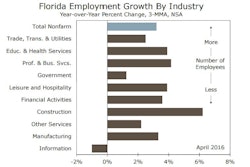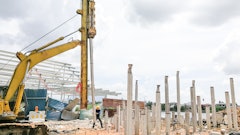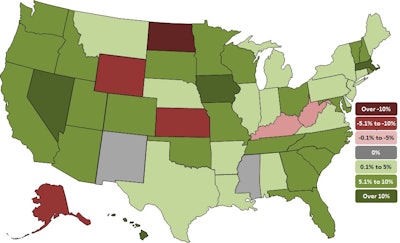
Forty-two states and the District of Columbia added construction jobs between April 2015 and April 2016 while construction employment increased in only 23 states between March and April, according to an Associated General Contractors of America analysis of Labor Department data. Association officials said the slowdown in monthly job growth was likely driven by mild winter weather that allowed firms to start their spring hiring season early but cautioned that many firms will have a hard time finding qualified workers as demand grows.
“The slowdown for the month may reflect the elevated hiring that occurred earlier this year in many states that experienced mild winters,” said Ken Simonson, chief economist for the association. “With construction employment having declined for the year in only six oil- or coal-intensive states, the industry appears to have plenty of work ahead and should resume hiring if firms can find enough qualified workers.”
California added the most construction jobs between March and April (12,000 jobs, 1.6%). Other states adding a high number of construction jobs include:
- Florida (4,400 jobs, 1%)
- Wisconsin (3,500 jobs, 3.1%)
- Iowa (3,300 jobs, 3.8%)
- Connecticut (2,400 jobs, 4.2%)
Idaho added the highest percentage of construction jobs (4.3%, 1,700 jobs) during the past month, followed by Connecticut, Iowa and Wisconsin.
Construction employment declined in 25 states and D.C. during the past month and held steady in Maryland and Vermont. Tennessee shed more construction jobs than any other state (-3,500 jobs, -2.8%), followed by:
- Virginia (-3,000 jobs, -1.6%)
- Michigan (-2,700 jobs, -1.7%)
- Kentucky (-2,300 jobs, -3.0%)
- New Jersey (-1,800 jobs, -1.2%)
Rhode Island lost the highest percentage of construction jobs between March and April (-3.8%, -700 jobs), followed by:
- Montana (-3.3%, -900 jobs)
- Kentucky
- Mississippi (-2.9%, -1,400 jobs)
- Tennessee
California also added the most construction jobs (49,800 jobs, 7%) between April 2015 and April 2016. Other states adding a high number of new construction jobs for the past 12 months include:
- Florida (30,100 jobs, 7.1%)
- Massachusetts (13,900 jobs, 10.2%)
- Georgia (13,600 jobs, 8.2%)
Hawaii added the highest percentage of new construction jobs during the past year (18.4%, 6,200 jobs), followed by:
- Iowa (13.5%, 10,600 jobs)
- Massachusetts
- Nevada (10.2%, 6,900 jobs)
North Dakota lost the highest percent and total number of construction jobs (-12.9%, -4,600 jobs). Other states that lost jobs for the year include:
- Wyoming (-10%, -2,400 jobs)
- Alaska (-9.7%, -1,800 jobs)
- Kansas (-5.1%, -3,100 jobs)
- Kentucky (-1.1%, -800 jobs)
- West Virginia (-0.9%, -300 jobs)
Construction employment was unchanged for the year in New Mexico and Mississippi.
Association officials said they expect firms in many parts of the country will continue to expand their headcount amid growing demand for many types of construction projects. They said many firms continue to be concerned about the lack of qualified workers. Those shortages are one reason the association recently launched its new online AGC Career Center, which allows firms to find qualified workers who are looking for jobs.
“As spending on projects continues to grow during the busy summer construction season, more firms will be looking to add qualified workers,” said Stephen E. Sandherr, the association’s chief executive officer. “With few students getting steered into construction careers, we want to make it as easy as possible for contractors to connect with available workers from across the country.”
View the state employment data by rank and state.




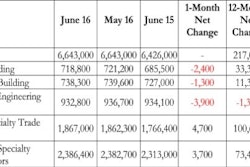
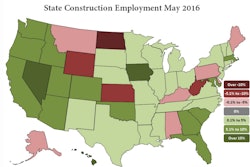
![[VIDEO] US Home Sales Jump to Highest Level Since 2010](https://img.forconstructionpros.com/files/base/acbm/fcp/image/2016/06/default.57573510917c6.png?auto=format%2Ccompress&fit=crop&h=167&q=70&w=250)
